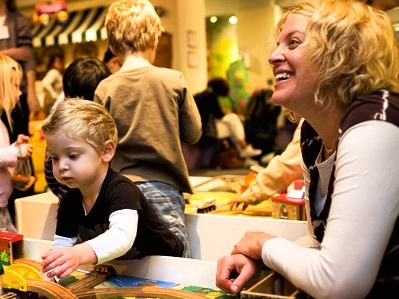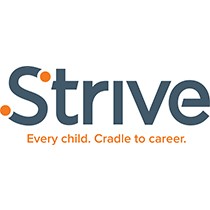
The Habitot Children’s Museum first opened its doors in downtown Berkley in 1998, and the institution has served over 950,000 residents of underserved communities in the Bay Area since. The 7,000 sq. foot facility is home to exhibits that help teach kids about the value of physical activity, water preservation, and art and culture. The hands-on Museum encourages early childhood education and aims to help support a generation of curious and creative kids.
Read more »
Terms:Arts & Culture, Community Building, Creative Economy, Cultural Institutions, Downtown Development, Education, Families, IFC Best Practice, Institutions as Fulcrums of Change , Museums, Youth

The Strive Partnership is an effort launched by community leaders in the Cincinnati region in 2006 that relies on innovative strategies to improve student education outcomes. The Partnership has designed a strategic approach to education reform that can be applied to communities throughout the country. The approach relies on a collaborative effort from community stakeholders from all sectors of the economy to encourage learning and development beyond the walls of their schools.
Read more »
Recess for seniors may sound unusual, but it is just one of many volunteer roles that the Rochester School District’s Office of Extended School Programs has developed to increase community involvement in its elementary schools. The Rochester School Department defines as its goal the enhanced achievement and academic success of students who participate in extended-school programs. Volunteers play a key role in support of these programs. The Office organizes enrichment programs by sharing resources, creating partnerships with businesses and community organizations, and involving parents.
These programs have proven to be a boon to both students and volunteers, many of whom are older adults. Intergenerational activities benefit senior volunteers, who take pleasure in giving back to their communities and participating in a structured social environment. They often exult in the joy of working with children.
Read more »
 photo credit LIVENorthern New Jersey’s LIVE (Lifelong Involvement for Vital Elders), an initiative of the Jewish Federation of Greater Metrowest New Jersey (UJC), works with local leaders to make the communities it serves better places in which to grow older. LIVE organizes recreational activities and personal-development programs that help older adults stay active and involved in their communities, thereby helping them to age in place and continue to contribute to their communities well into their older years. The activities offered by LIVE include yoga, Tai Chi, walking clubs, health workshops, and employment counseling. While LIVE is led by United Jewish Communities, it encourages participation from seniors of all ages and backgrounds. photo credit LIVENorthern New Jersey’s LIVE (Lifelong Involvement for Vital Elders), an initiative of the Jewish Federation of Greater Metrowest New Jersey (UJC), works with local leaders to make the communities it serves better places in which to grow older. LIVE organizes recreational activities and personal-development programs that help older adults stay active and involved in their communities, thereby helping them to age in place and continue to contribute to their communities well into their older years. The activities offered by LIVE include yoga, Tai Chi, walking clubs, health workshops, and employment counseling. While LIVE is led by United Jewish Communities, it encourages participation from seniors of all ages and backgrounds.
Read more »
 photo credit Project SHINE photo credit Project SHINE
“When I first came to America, I only knew a couple letters. I couldn't communicate with anybody. And I learned about this program and I started (to learn English). I have been here for three years and now I have built a basic vocabulary that I can carry my daily life. It basically helped me to live in America." -Project SHINE participant
In the early 1980s, Nancy Henkin, founder and director of the Intergenerational Center at Temple University, was shocked by the news that loneliness and social isolation led an elderly Asian woman to commit suicide, at a time when it was commonly assumed that older immigrants were part of tight-knit and supportive communities. Henkin realized that older immigrants often struggle with language barriers, changes in customs, and differences in social roles more than their younger counterparts, and began working to establish a program that could support them. Project SHINE was launched in 1985, to reach out and provide aging immigrants with language and cultural resources to help them adapt in their new community.
Read more »
Terms:2012, Aging, Aging in Place, AIP Best Practice, City Leaders Institute on Aging in Place, Community Development, Community Engagement, Education, Faith Community, Families, Health & Wellness, Heritage, Immigration, Intergenerational, Jobs, Life-Long Learning, Multicultural, National, Youth
|
|